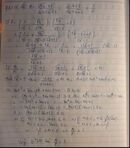Hãy nhập câu hỏi của bạn vào đây, nếu là tài khoản VIP, bạn sẽ được ưu tiên trả lời.

Gọi x1,x2x1,x2 là nghiệm của x2−mx−2=0(1)x2−mx−2=0(1)
→{x1+x2=mx1x2=−2→{x1+x2=mx1x2=−2
→⎧⎪ ⎪⎨⎪ ⎪⎩1x1+1x2=x1+x2x1x2=−m21x1.1x2=−12→{1x1+1x2=x1+x2x1x2=−m21x1.1x2=−12
→1x1,1x2→1x1,1x2 là nghiệm của phương trình
x2+m2x−12=0

\(A=\frac{2\sqrt{x}+1}{x+\sqrt{x}+1}\)với \(x=16\Rightarrow\sqrt{x}=4\)
\(=\frac{2.4+1}{16+4+1}=\frac{9}{21}=\frac{3}{7}\)
Vậy với x = 16 thì A nhận giá trị là 3/7
b, Sửa rút gọn biểu thức B nhé
Với \(x\ge0;x\ne1\)
\(B=\left(\frac{1}{\sqrt{x}-1}-\frac{\sqrt{x}}{1-x}\right):\left(\frac{\sqrt{x}}{\sqrt{x}-1}-1\right)\)
\(=\left(\frac{1}{\sqrt{x}-1}+\frac{\sqrt{x}}{\left(\sqrt{x}\pm1\right)}\right):\left(\frac{\sqrt{x}-\sqrt{x}+1}{\sqrt{x}-1}\right)\)
\(=\frac{\sqrt{x}+1+\sqrt{x}}{\left(\sqrt{x}\pm1\right)}.\frac{\sqrt{x}-1}{1}=\frac{2\sqrt{x}}{\sqrt{x}+1}\)
c, Ta có : \(M=\frac{A}{B}\)hay \(M=\frac{\frac{2\sqrt{x}+1}{x+\sqrt{x}+1}}{\frac{2\sqrt{x}}{\sqrt{x}+1}}\)
\(=\frac{2\sqrt{x}+1}{x+\sqrt{x}+1}.\frac{\sqrt{x}+1}{2\sqrt{x}}\)
\(=\frac{\left(2\sqrt{x}+1\right)\left(\sqrt{x}+1\right)}{2\sqrt{x}\left(x+\sqrt{x}+1\right)}\)

\(x^2+x-a=0\)
\(x\left(x+1\right)=a\)
ta có snt thì không chia hết cho số nào ngoài 1 và chính nó
vậy a là số nguyên tố thì \(\orbr{\begin{cases}x=1\\x+1=1\end{cases}\orbr{\begin{cases}x=1\\x=0\end{cases}}}\)
\(TH1:x=0\)
\(0.1=a\)
\(0=a\left(KTM\right)\)
\(TH2:x=1\)
\(1.\left(1+1\right)=a\)
\(2=a\left(TM\right)\)
vậy chỉ có nghiệm x duy nhất là x=1


a: Khi m=1 thì phương trình sẽ là:
\(x^2-2x+1-1=0\)
=>x^2-2x=0
=>x(x-2)=0
=>x=0 hoặc x=2
b: \(\text{Δ}=\left(-2\right)^2-4\left(m-1\right)=4-4m+4=-4m+8\)
Để phương trình có 2 nghiệm thì -4m+8>=0
=>-4m>=-8
=>m<=2
\(x_1^3+x_2^3< =15\)
=>\(\left(x_1+x_2\right)^3-3x_1x_2\left(x_1+x_2\right)< =15\)
=>\(2^3-3\cdot2\cdot\left(m-1\right)< =15\)
=>\(8-6m+6< =15\)
=>-6m+14<=15
=>-6m<=1
=>\(m>=-\dfrac{1}{6}\)
=>\(-\dfrac{1}{6}< =m< =2\)